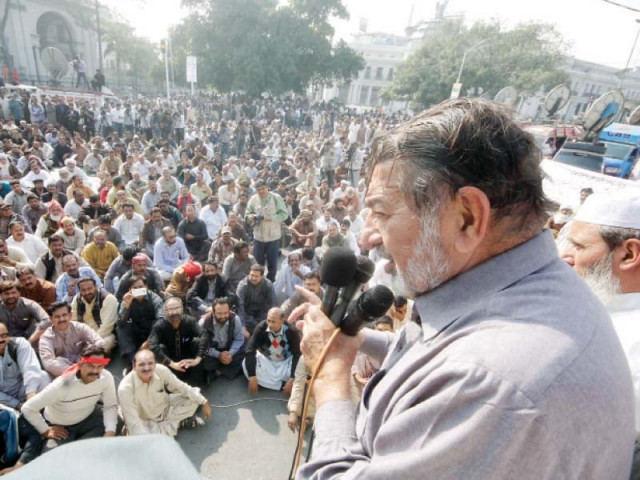No to privatisation: FESCO workers threaten to stop printing bills
‘If that doesn’t work, FESCO employees will stop reading meters’

Khurshid Ahmed addressing workers at Wednesday’s demonstration on The Mall, Lahore. PHOTO: ABID NAWAZ/EXPRESS
Hundreds of Faisalabad Electric Supply Company Workers held a demonstration for the seventh consecutive day on Wednesday to protest the government’s decision to privatise the company. Pakistan Wapda Hydro Electric Central Labour Workers’ Union regional chairman Rana Ghulam Jaffar said in the first phase of their protest, they would stop printing and distributing electricity bills. “
If the government does not take back its decision, FESCO employees will stop reading meters. “We have sympathisers in the computer and customer service departments.”
Jaffar was addressing scores of workers at a sit-in in front of the city government secretariat. The protesters locked FESCO offices and blocked the Canal Road, in front of the FESCO headquarters, for traffic for several hours. They walked up to Zila Council Chowk and held a sit-in in front of the secretariat.
Jaffar said the rationale for privatising the FESCO was suspect. “We have the minimum line losses and maximum recovery of dues among all distribution companies…the move to privatise has nothing to do with improving efficiency.”
He said privatising the FESCO would put the livelihood of thousands of employees at risk.
“The government must review its decision and immediately withdraw its plan to privatise the FESCO otherwise we will strike for an indefinite period and switch off electricity to the entire region.”
He said FESCO workers had been protesting against the move to privatise the distribution company. “The government does not even want a dialogue on this subject.”
In Lahore, the All Pakistan WAPDA Hyrdo Electric Union held a protest today in solidarity with FESCO workers.
Khurshid Ahmed, the general secretary of the union, said FESCO’s employees had been protesting against the government’s decision to privatise the company since November 6, 2015.
It is the government’s job to provide electricity, he said. “Article 9 of the Constitution says that the government is obligated to deliver basic amenities to the people.”
Past experiences with privatising supply companies showed that the policy did not favour the workers. “Investors and owners didn’t give a toss about workers at the lowest rung.”
Ahmed said the Karachi Electric Supply Company, the Multan Electric Power Company and the Rawalpindi Electric Power Company did not provide electricity to rural areas because it was not profitable. “Provision of electricity is a basic right.”
Secondly, the price of electricity would rise if the owners were looking to make profits, he said.
Ahmad urged the government to establish hydel power stations since they were a source of cost-effective electricity. He said thermal power stations provided electricity at Rs20 to Rs25 per unit while thermal stations run by WAPDA provided electricity at Rs2.5 per unit.
He also discussed the Sundar factory collapse and demanded a judicial enquiry into the matter. He said if no measures were taken to prevent privatisation, WAPDA workers would carry out a country-wide strike on November 15.
Published in The Express Tribune, November 12th, 2015.



















COMMENTS
Comments are moderated and generally will be posted if they are on-topic and not abusive.
For more information, please see our Comments FAQ